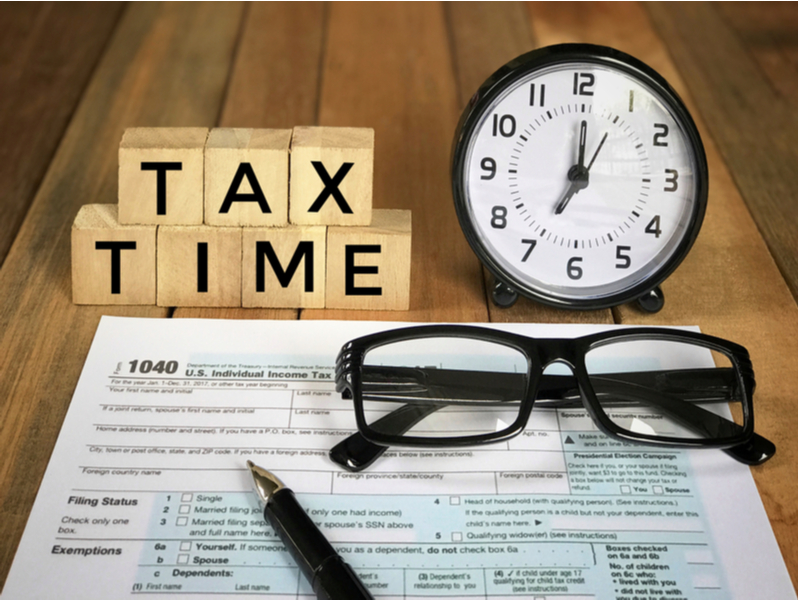How to Save Money on Taxes?
The taxman is coming in a few months. And like everyone else during tax season, you want to make sure that you pay as little as possible but not too little that you get an unexpected tax bill in the mail. In short, you want to save money on your taxes this year and every year after. No worries. That goal is doable if you know what moves to make. To help you learn how to save money on taxes, we outline what strategies you can take before, during, and after you file your taxes. This way, you can put more money in your pocket and not with the IRS.
How to File Taxes?
Learning how to file taxes properly is one way to save money on your tax bill. Any mistakes you make can result in overpaying or owing them money, leading to a bigger tax bill that includes penalties, fees, and interest. In short, you can't afford to file your taxes improperly. Below, we provide you with tips on filing your taxes correctly and various ways to save money on taxes.
Before Filing

Before you get your calculator and spreadsheet out, you need to ensure that you have everything you'll need. The key to learning how to save money on taxes is to always have the right information and documentation in hand before you start the process.
So, what do you need? The tax prep checklist is as follows:
- Personal information - This includes your social security number (as well as your spouse and dependents, if any) and your tax return from last year.
- Income - Any documentation confirming how much money you received last years, such as your W-2 forms and 1099 forms.
- Receipts - Whether you claim the standard deduction or itemize your deductions, you're going to need the receipts to figure out which option provides you with more significant savings.
Besides getting all your information and documents in order, you also need to prepare a list of all non-taxable income. Tax-free income is money you receive that the IRS cannot touch. These include:
- Alimony received after December 21, 2018
- Health insurance premiums
- Group-term life insurance premiums
- Adoption expense reimbursements for qualifying expenses
- Disability Benefits or Pension payments
- Child Support
- Qualified scholarships and grants
- Death payments
- Military allowances
- Life insurance benefits
- Disaster relief grants
- Welfare benefits
- Gifts, bequests, and inheritances
- Court-awarded compensatory damages
- Cash rebates from dealers or manufacturers

Also, take note of tax deductions you can successfully claim. For example, you may be able to claim the Earned Income Tax Credit if you have a low income (less than $57,000). You can also claim a tax break for paying dues and initiation fees as a union member. Below are other examples of deductions that can help you save money:
- Mileage expenses - You are allowed to deduct a certain amount from costs incurred when using your vehicle for work, medical, or charitable purposes.
- Child tax credit - If you have dependents, you may qualify for a tax credit of $2,000.
- Student tax credit - A student or a parent may claim the American Opportunity Credit and Lifetime Learning Credit, which can amount to thousands of dollars per student.
- Teacher or Educator Tax Deductions - Teachers can also claim deductions for expenses that they made related to their job. For example, if they purchase personal protective equipment to hold physical classes.
- Charity donations - You may be able to deduct the value of money and goods you donated to charity or religious organizations.
- Adoption tax credit - You may be able to claim this credit if you have adopted a child.
- Medical expenses - You might be able to deduct your medical expenses if they exceeded 7.5% of your income.
- Health Savings Account Deduction - If you contribute to a health savings account (HSA), it can be deducted from your taxable income even if you use the standard deduction.
- Student Loan Interest Deduction - This is another above-the-line deduction. It allows you to deduct up to $2,500 in interest paid on your student loans. You can even deduct interest from your loans on your tax return if you used the loan for qualified higher education expenses or business expenses.
- College savings - If you set aside money for your child's college tuition by contributing to your state's 529 plan, you may be able to shave a few dollars off your state return.
- Flexible Savings Account - You can set aside up to $2,550 a year pre-tax in an FSA to be used for qualified health expenses such as deductibles. This amount is non-taxable, but you can only avail of an FSA through employer-sponsored healthcare plans.
- Coronavirus relief measures - Stimulus payments you received from coronavirus relief packages are non-taxable. In contrast, these relief packages' unemployment income can make you eligible for certain tax credits and deductions.
After Filing
What about when you've already filed your taxes? Are there still ways to save money on taxes then? Yes, there is. Planning your taxes around October to December can help you reduce the amount of taxes you pay and even get you a tax refund in the future. So, it doesn't matter if you've already submitted your tax return. It's never too early to get started on your deductions.
One of the most important lessons you need to learn about saving money on taxes is to check your W-4. The W-4 form is an IRS form called the "Employee's Withholding Certificate." This tells employers how much tax they need to withhold from an employee's paycheck and remit to the IRS and the state on their behalf. So, you need to make sure that your W-4 reflects the right amount of money being withheld from your paycheck to cover your whole tax bill for the full year. Changes in your situation, such as getting married or divorced or having a kid, can impact how much your income will need to be paid to the IRS. Changes in the tax laws can also have a similar effect. Adjusting your W-4 as needed can increase your take-home pay or save you the money you'll need to pay in fees and interest if you spend less than what you owe.
How to Save Money on Property Taxes?
Aside from income tax, you can also save money on property taxes. You can save money on property taxes by deducting certain home-related expenses. For example, if you made home energy improvements, you may deduct up to 30% of the costs. Payments made to the interest of your home mortgage and interest payments on home equity loans and lines of credit are also deductible. Tax breaks are also given to specific individuals such as senior citizens, veterans, active military, and disabled people. However, to be sure that you're on the right path, we recommend that you visit your local or county tax office to discuss how you can reduce your property taxes.
Open an IRA to Save on Taxes
Get some tax savings by investing in your retirement. Contributions made to your IRA can be deducted from your taxable income even if you take the standard deduction. Aside from your IRA, you can also choose to set money aside in a tax-deferred retirement account, such as individual 401(k)s and Simplified Employee Pensions (SEPs).
Tips for Filing Taxes
Before we get into our varied tips for filing taxes, let's get one thing out of the way. One of the most annoying things about paying your taxes is that you have to pay a fee. You're already getting taxed, so it just adds insult to injury if you have to foot the bill for filing as well, right? Fortunately, filing taxes for free is now possible using a variety of software products. For example, you can use the IRS Free File, a partnership between the IRS and Free File Alliance, a nonprofit group of tax software providers. These providers include FreeTax Returns.com, TaxSlayer, TurboTax Free File Program, and eSmart Free File Edition. Please take note that each program will have its requirements and limitations. Most providers will only offer free tax filing services to individuals who have an income below $66,000. You can check out the different tax software products that allow you to file your taxes for free here.
How to Save Money on Taxes If You're Self-Employed

As a self-employed individual, there are plenty of ways on how to save money on taxes. You can deduct work-related expenses such as parking fees, vehicle use, other business travel expenses such as lodging and meals, home office expenses, business insurance, rent, health insurance premiums, etc. You can even deduct credit card processing fees, interest on business loans, and repairs on business property and equipment from your taxable income.
But what if your business isn't doing well? How can you pay business taxes with no funds? If you're unable to come up with the money to pay the IRS in full, it's still essential that you file your return by the deadline and spend as much as you are able. That being said, you should also get in touch with the IRS to discuss payment options. You may be granted an extension, or the IRS may agree to an installment plan. If you cannot get to an agreement, you may obtain a personal loan or a credit card to pay your tax bill. Take note that you need to understand how credit cards work if you go this route. Paying your tax bill through a credit card will incur a processing fee plus interest. Personal loans also incur interest, but the fixed interest rate may be easier to include in your monthly budget.
How to Save Money on Taxes If You're an Employee
Employees can reduce their tax bill by checking the deductions we've mentioned above. But there are a few job-related expenses for these individuals that we haven't tackled yet.
These days, more and more employees work from home, making them eligible for certain tax deductions. A home office deduction is possible if the employee exclusively uses the space for business purposes. A portion of home-related expenses such as mortgage interest, certain utilities, homeowners insurance, and even property taxes may be deducted from your taxes. Payments you make on business-related travel such as food and lodging may also qualify for a tax deduction.
You must always keep accurate records of your job-related expenses such as itemized receipts, bank statements, and credit card statements. This will allow you to have proof in case you are questioned about the deductions you made. Also, you must be aware of the limitations on deductions. Employee expenses must be itemized and are subject to a 2% floor. What does that mean? For example, if your adjusted gross income is $100,000, then $2,000 is the 2% floor. This means that you can only deduct your job-related expenses that go over that amount. So, if your job-related expenses cost a total of $3,000, you can only deduct $1,000.


